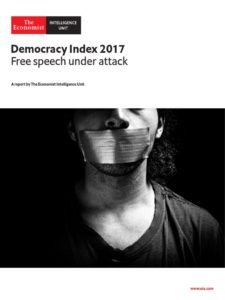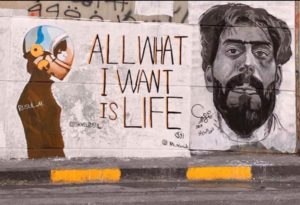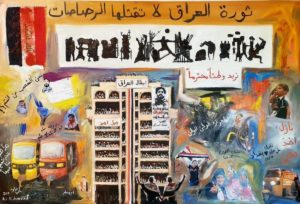As a fresh wave of protests generates speculation about an Arab Spring 2.0, the challenge for MENA democrats is to move beyond calls for regime change and focus on building realistic partnerships for democratic change.
The economic and political conditions that produced the Arab Spring have only worsened in recent years. With the exception of Tunisia, where the opposition succeeded in establishing a democratic political system that remains in place today, many countries of the Middle East have seen an autocratic restoration since 2011, notes Maha Yahya, Director of the Carnegie Middle East Center.
 This regional regression is captured by the Economist Intelligence Unit’s Democracy Index, which shows that together the Middle East and North Africa continue to make up the lowest performing region in the world on all measures of democracy: civil liberties, the electoral process and pluralism, the functioning of the government, political culture, and political participation, she writes for Foreign Affairs:
This regional regression is captured by the Economist Intelligence Unit’s Democracy Index, which shows that together the Middle East and North Africa continue to make up the lowest performing region in the world on all measures of democracy: civil liberties, the electoral process and pluralism, the functioning of the government, political culture, and political participation, she writes for Foreign Affairs:
The Middle East today is witnessing a perfect storm: as social and economic conditions erode and regimes double down on the repressive policies that provoked the Arab Spring, a new generation is coming to the fore….. What today looks like a regional regression since 2011 may well, in the future, be regarded as the initial phase in a much longer process of Arab revival. The road to that revival will likely be a difficult one, paved with pain. But if there is one thing that Arab populations know, it is that the status quo cannot be sustained.

MEMRI
The powerful images of pro-democracy protests emerging from Beirut, Baghdad and Algiers remind us once again that Arab authoritarianism has outstayed its welcome. But the challenge for Arab democrats is to move beyond simply calling for democracy and instead focus on building realistic pathways for democratic change, argues Jamal Khashoggi fellow Ezzedine C. Fishere.
The idea that authoritarian rulers and their coercive apparatus are the main barriers to Arab democracy is a misleading simplification. Authoritarianism plays social, economic and political roles. Replacing it with democratic governance requires much more than toppling regimes, he writes for the Washington Post:
A million protesters demanding good governance will not achieve it. For lasting change, Arab democratic leaders must begin building robust partnerships among themselves and envisaging deals with those that benefited from authoritarianism. They must also prepare realistic pathways to revive dysfunctional state institutions. RTWT
Algeria’s protest movement shows no signs of abating, adds Sharan Grewal, an assistant professor of government at William & Mary and a visiting fellow at the Brookings Institution. Nine months in, demands for systemic change have only grown. However, as protests struggle to achieve that goal, support may grow for complementing protests with strikes or sit-ins. But what is clear is that the regime has been unable to appease, repress or tire out the protesters, she writes for the Post.

MEMRI
A West beset by its own identity crisis and internal dilemmas may be tempted to ignore all this distant turmoil in the Middle East – and this would be a mistake, argues MEMRI analyst Alberto M. Fernandez.
At the very least, Western governments, including the U.S., are going to have to be much more adept at threading the needle in their fraught relationship with the region’s unstable kleptocrats while trying to be open to the cry of the people on the street, he contends. How to influence odious regimes while keeping them at arms’ length? If history is any judge, this will be very difficult to manage.
The Carnegie Middle East Center’s fourth annual conference, titled A Disordered World: What to Expect in 2020, will take place on Monday, December 2, 2019 at the Phoenicia Hotel in Beirut. The conference will focus on what Carnegie scholars believe will be the most challenging issues facing the world, specifically the Middle East and North Africa region. The panels will include William J. Burns, the president of the Carnegie Endowment for International Peace, and Michele Dunne, director of Carnegie’s Middle East Program [both board members of the National Endowment for Democracy.] RSVP
Understanding the New Wave of Arab Protests: An Expert Panel
 A new series of demonstrations erupted across the Middle East and North Africa over the past 9 months, the Wilson Center adds. In Iraq, Lebanon, Sudan, Algeria, Jordan, and Egypt, protests were largely triggered by dire socio-economic conditions, corruption and a sense of economic and political disenfranchisement with outright calls for regime change in the case of Algeria, Sudan, and recently in Lebanon and Iraq. Join a discussion with a panel of Wilson and regional experts to analyze these events and understand the differences and similarities between the present wave of protests and those that erupted in 2011. RSVP
A new series of demonstrations erupted across the Middle East and North Africa over the past 9 months, the Wilson Center adds. In Iraq, Lebanon, Sudan, Algeria, Jordan, and Egypt, protests were largely triggered by dire socio-economic conditions, corruption and a sense of economic and political disenfranchisement with outright calls for regime change in the case of Algeria, Sudan, and recently in Lebanon and Iraq. Join a discussion with a panel of Wilson and regional experts to analyze these events and understand the differences and similarities between the present wave of protests and those that erupted in 2011. RSVP
Thursday, November 14, 2019 10:30am – 12:00pm. 5th floor Conference Room
Wilson Center, Ronald Reagan Building and International Trade Center, One Woodrow Wilson Plaza, 1300 Pennsylvania Ave NW, Washington, D.C. 20004
Phone: 202.691.4000